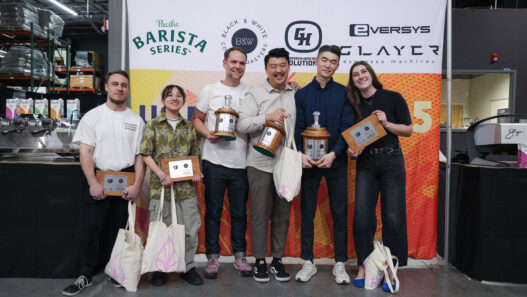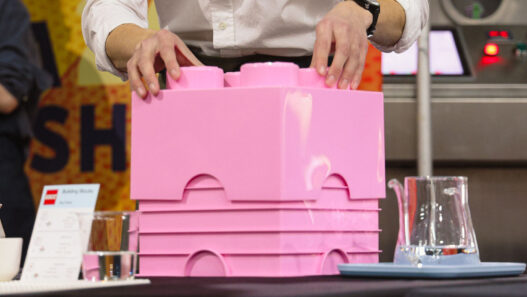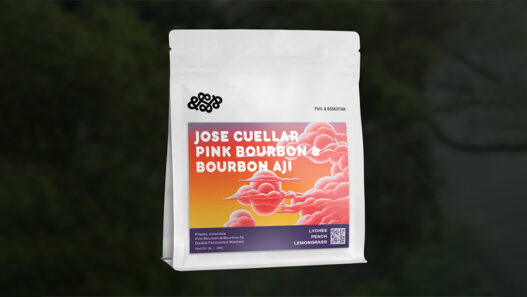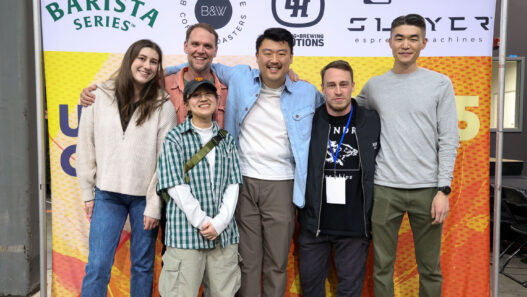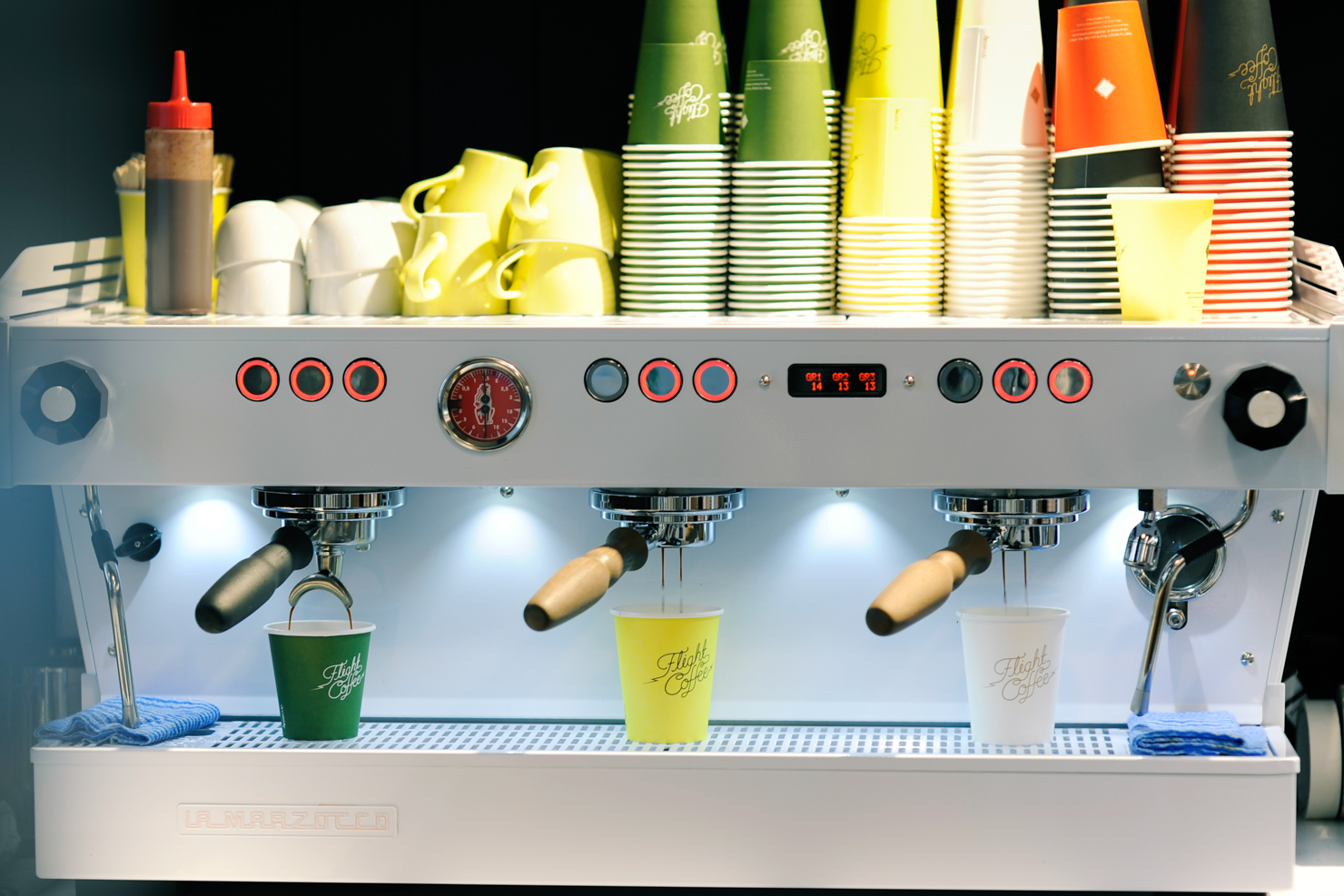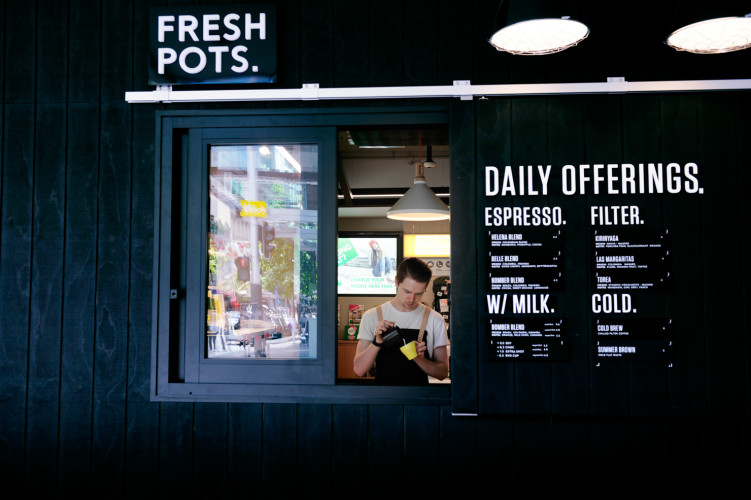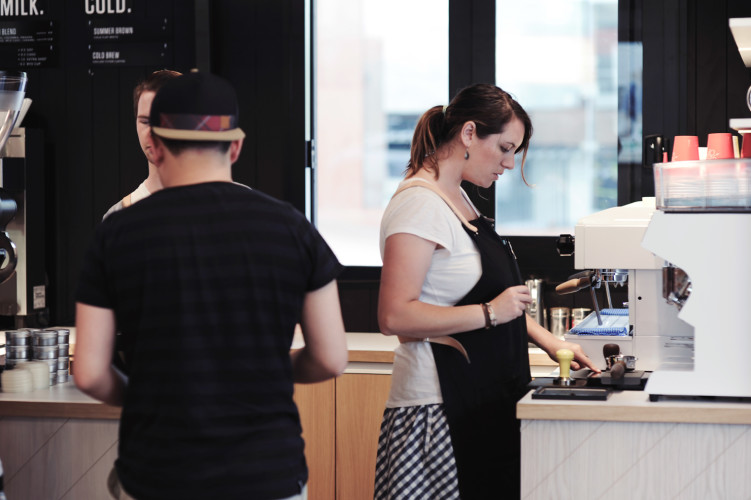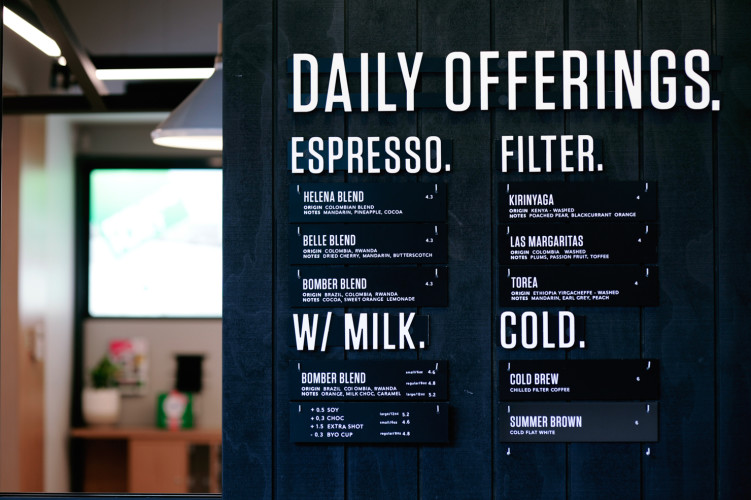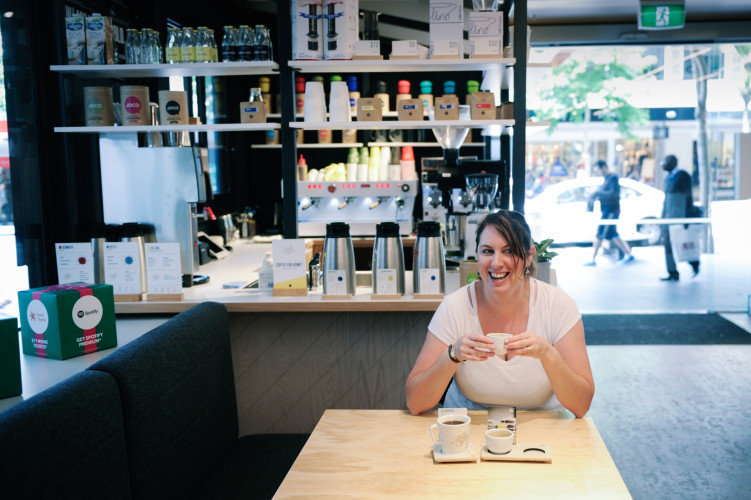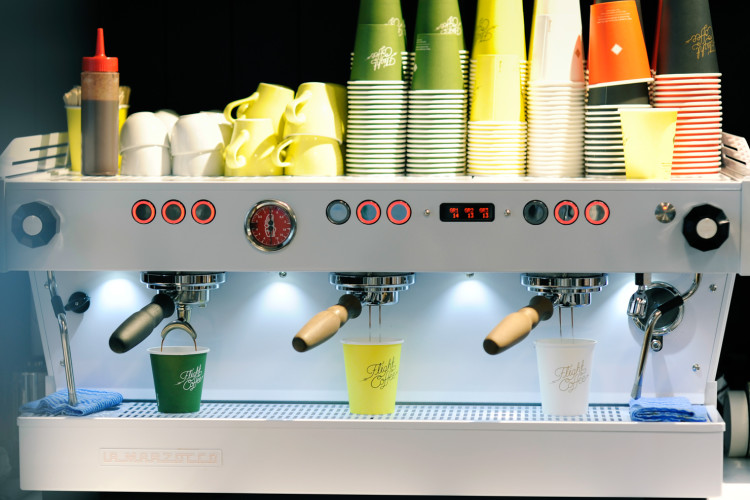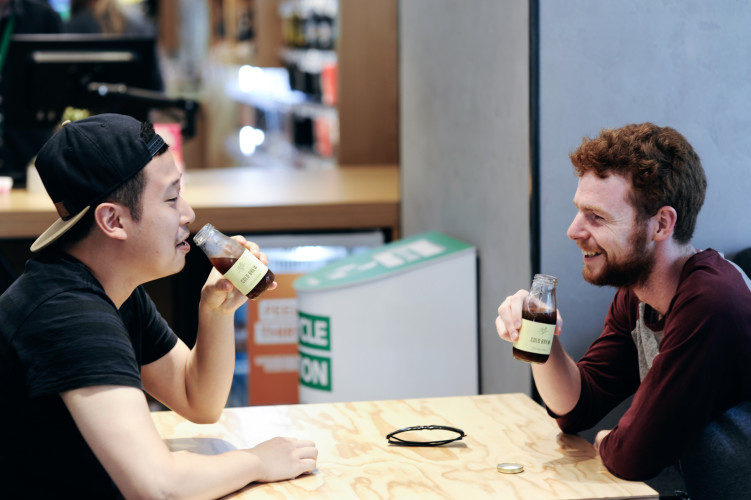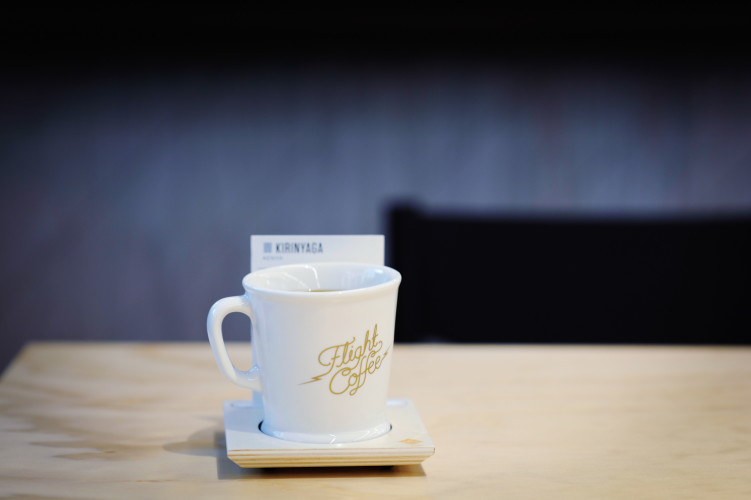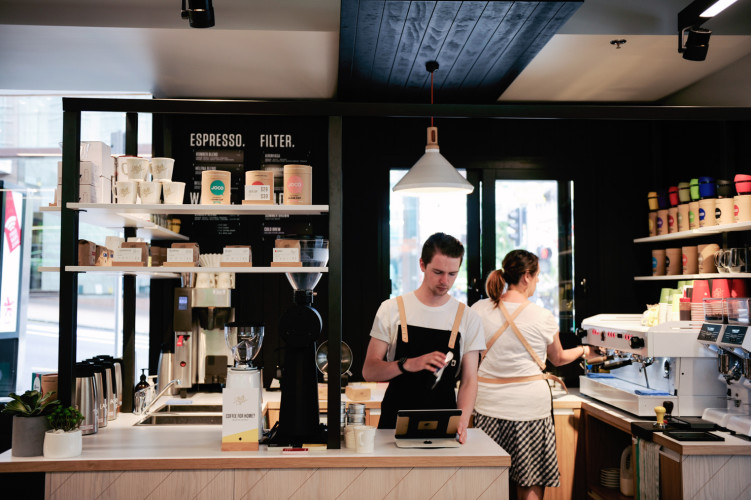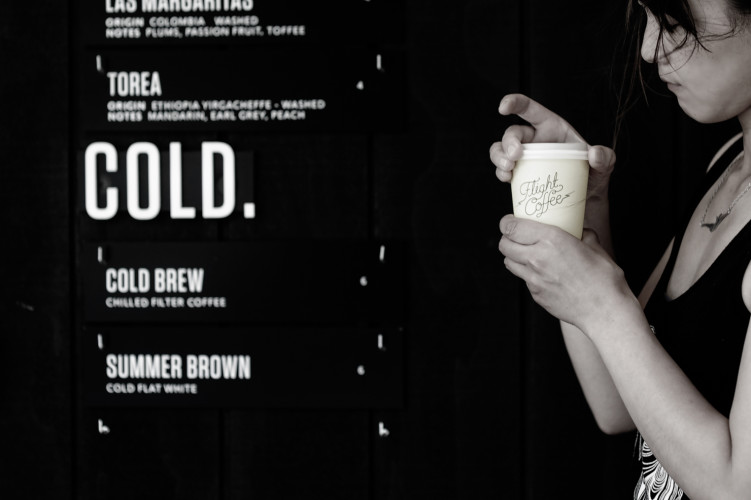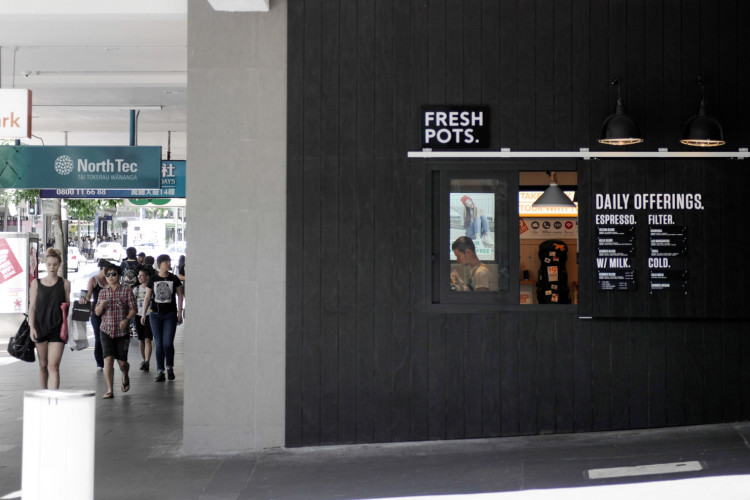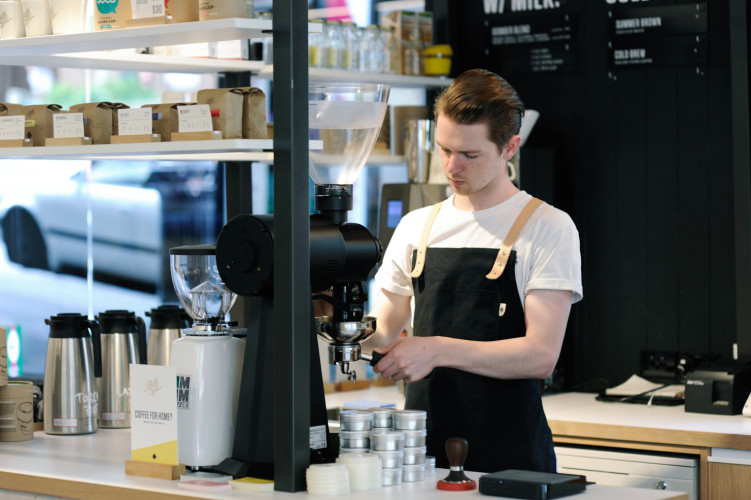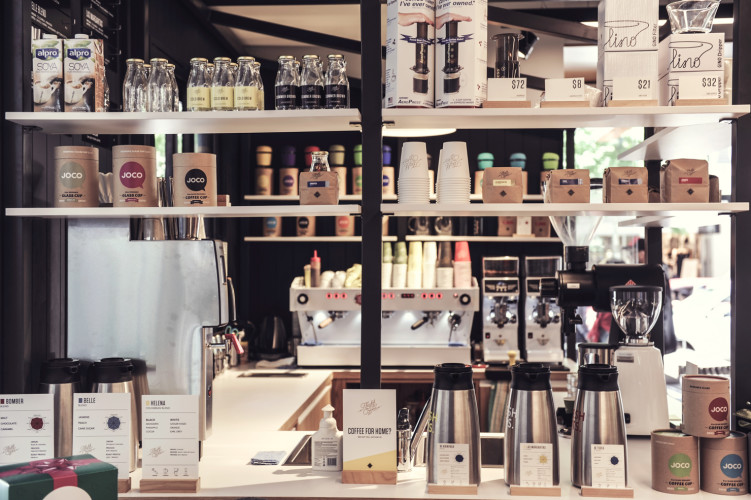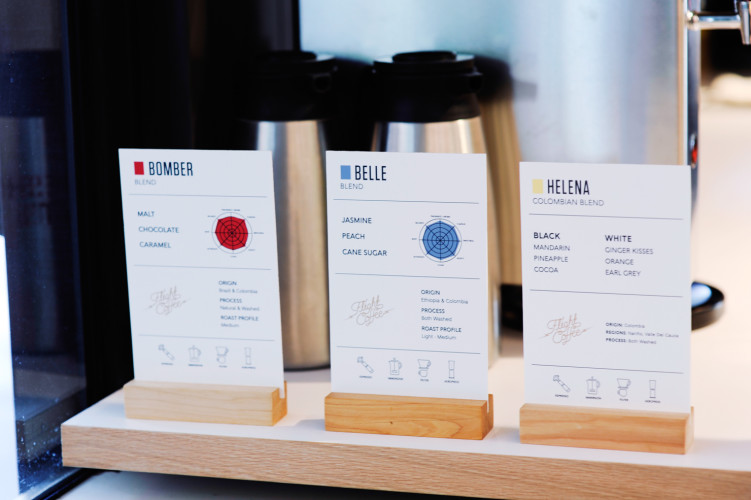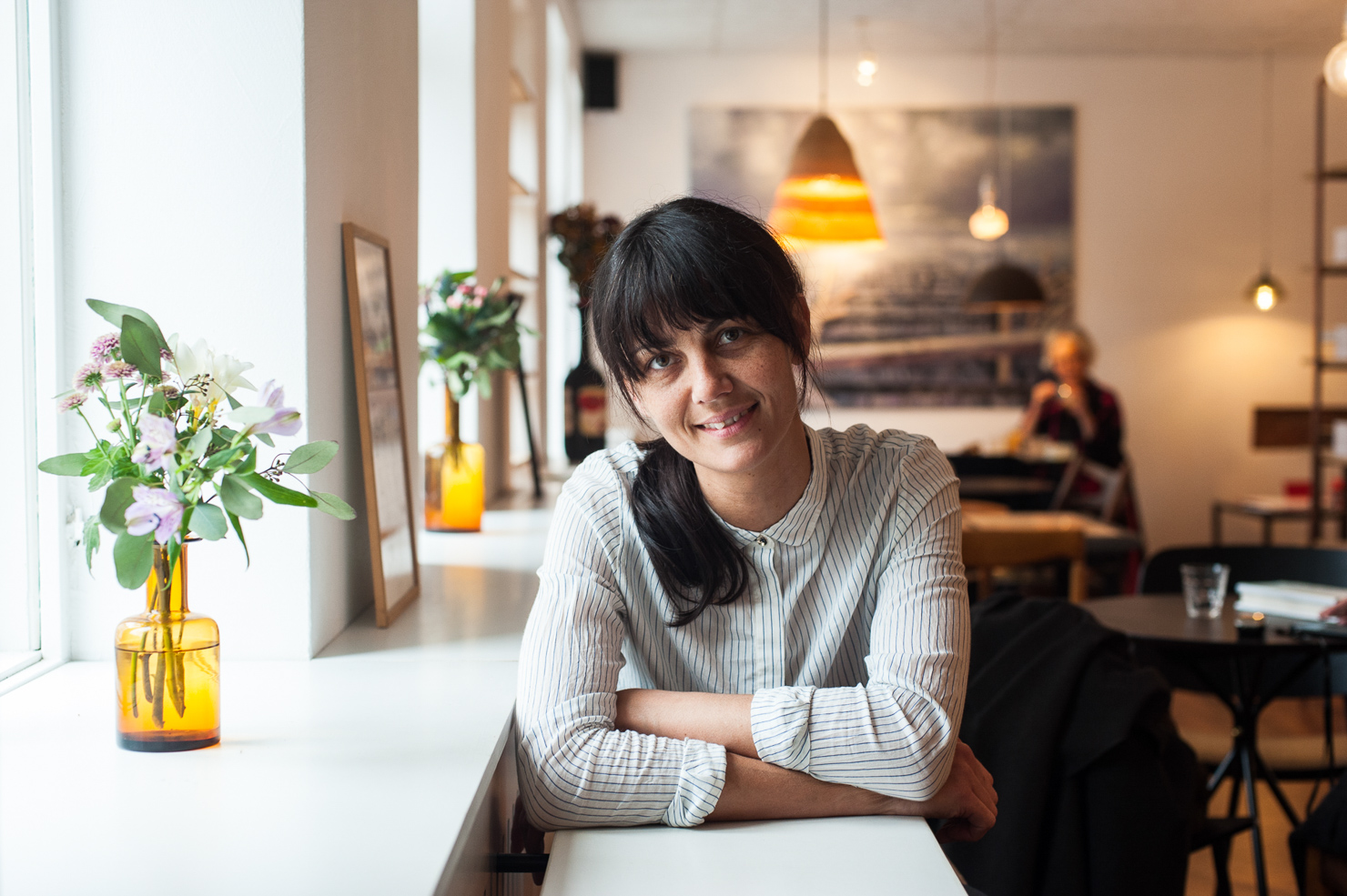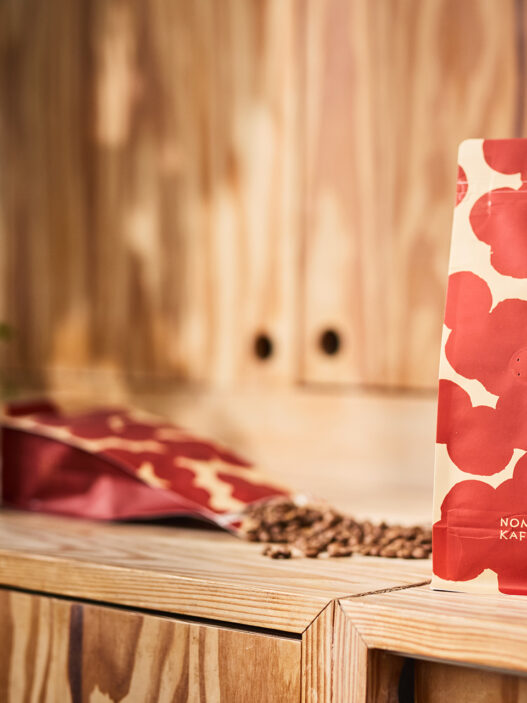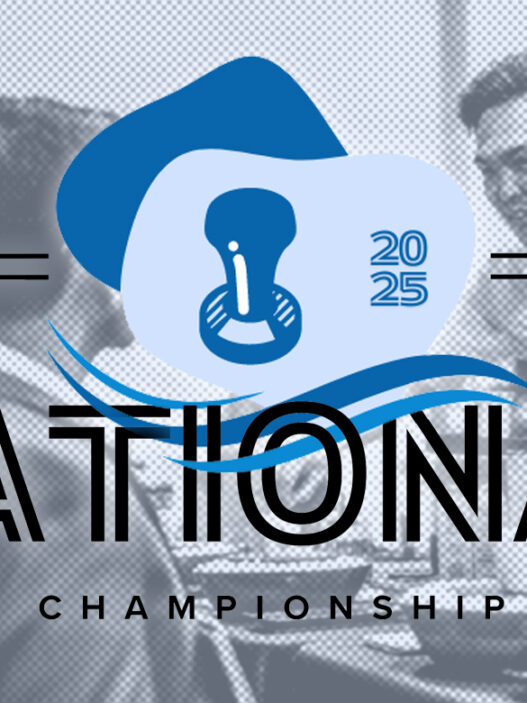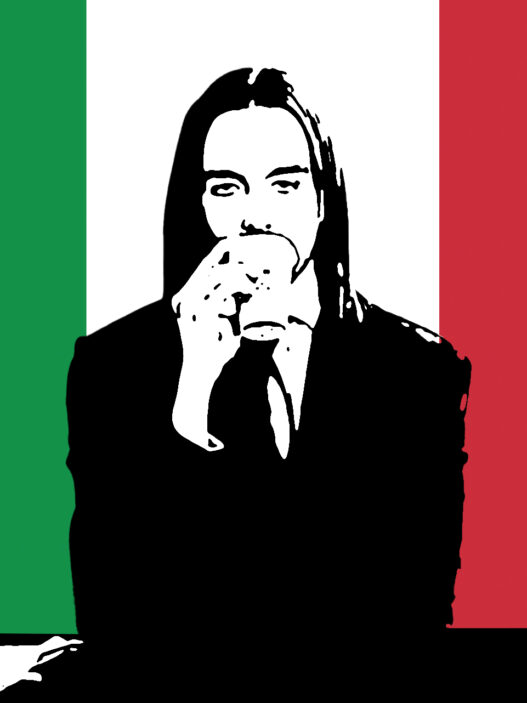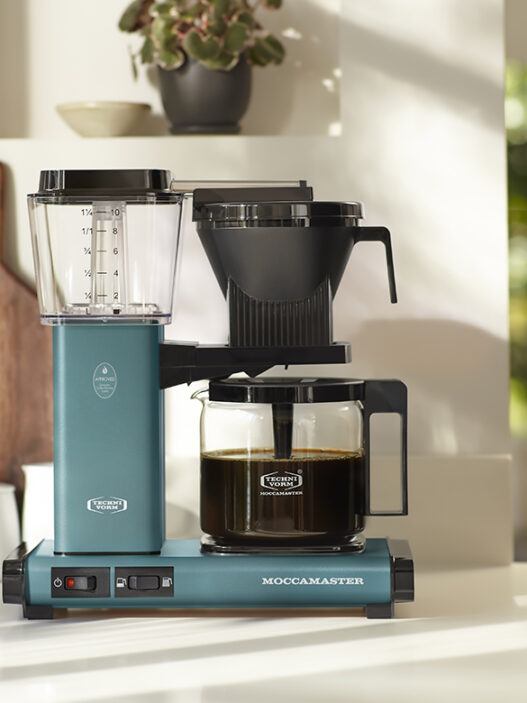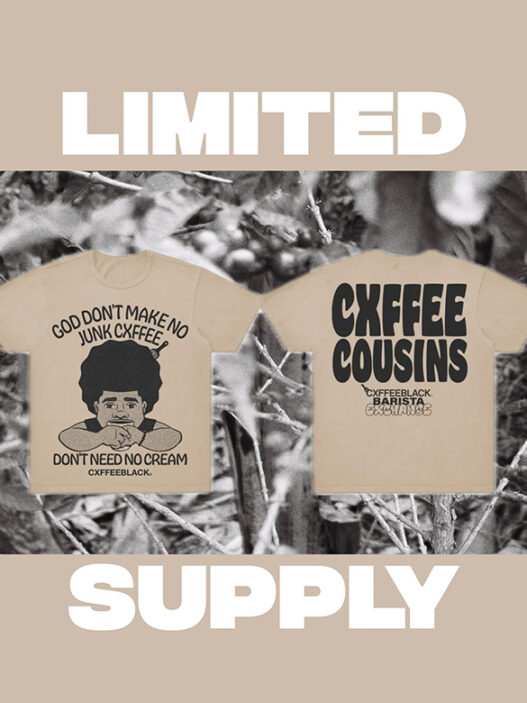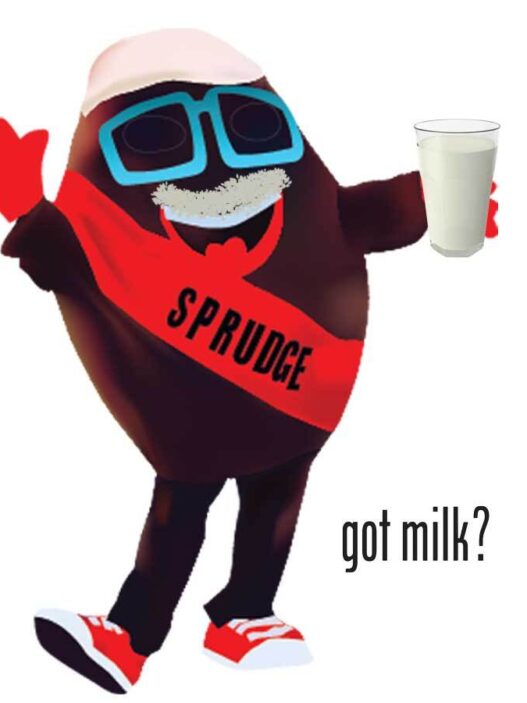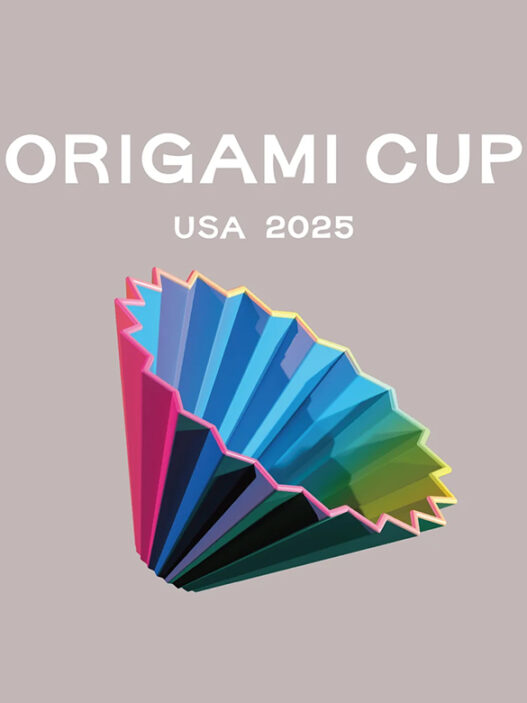Just four-and-a-half-million people live in New Zealand—fewer than New York City—and yet this small country at the bottom of the world continues to innovate and excite with its progressive approach to specialty coffee. One of the real leaders in the scene here is Flight Coffee, a Wellington cafe and wholesale roastery growing at an impressive rate while pushing cup quality, both as roasters and farm owners. Flight (like Sprudge) has been around since 2009, having just recently celebrated their 6th anniversary in business; the brand’s Helena farm restoration project in Colombia is now in its third year.
And now, an expansion to Auckland, New Zealand’s biggest city, a sprawling network of incorporated suburbs with buzzing shopping & culture districts. The latest from Flight is called Fresh Pots, located in the heart of Auckland’s Central Business District. Flight Coffee’s Nick Clark, a former NZ barista champion and World Barista Championship finalist, sat down with Sprudge co-founder Jordan Michelman to discuss the new project, in an interview accompanied by photos from noted Auckland coffee photographer Michael CY Park.
At just six square meters—65 square feet—Fresh Pots’ footprint is tiny, but its aims are large and noble. Sounds like New Zealand to us.
How’s things going for Flight? I understand you have just celebrated six years in business.
It’s good man! It feels like we’ve gotten to that stage at six years where we’re moving quickly, but it’s smooth. It’s nice and fun, and there’s heaps of energy floating around, but at the same time, a sense of calmness.
Tell us more about this new shop.
It’s in the Auckland CBD, smack bang in the middle of Queen Street. This used to be where a lot of good shopping happened, but now it’s become quite corporate, although some interesting shopping is coming back. This is Central Auckland, so there’s lots of walks of life all around us. We’ve got a digital design school next door, across the road is another school, and there’s a couple more universities within walking distance.
What are your hours? How big is the space?
We’re open 7 days a week, from 7am until 4pm Monday through Friday, and on weekends we’ll open from 9am until 4pm. The space is just six square meters, which means room for a couple of little tables, and we’ve got plans to get a leaner bar built outside in the near future.
How does a size like that inform the shop’s identity?
The whole aim for this place was to say, rather than come sit down, there’s a lot of people in the area who enjoy specialty coffee on a daily or weekly basis, but there’s nothing accessible or just easy nearby, and we wanted to fill the void. So at the shop you can sample different filter coffees & espressos, and also pick up lots of different beans for home. It’s about making the convenience come to them.
Because of the size of it, in a way, it forced us to offer strictly just coffee: no tea, no juice, no food. It’s just coffee—no danish in a bag. The whole interaction is about just the barista and the customer and the coffee.
Where does the name come from?
It’s from Dave Grohl’s video, “Fresh Pots” [At this point in the interview, Clark imitates Grohl’s cry of “Fresh paaaaahts” from said video—ed.] That’s been an internal joke for us the last couple of years. When this opportunity got put in front of us to do a shop in Central Auckland, we were keen to do it, but not just for the sake of selling cups of coffee. It gave us a chance to revisit some of our goals. Flight Coffee just turned six. We want to make coffee more accessible, and make education more open to spark curiosity and engage different questions. So we had the idea of making this like a little tasting concept.
The other idea behind “Fresh Pots” is that there’s always fresh coffee available, and the branding is fun. We were able to make some fun media with it too. It’s about encouraging people to taste different coffees. Usually here in New Zealand, people say, “I want a large flat white or a cappuccino,” or whatever, and syrups are quite popular in that part of town, but for us, we haven’t done any syrups—we are still offering mochas, because you have to have some common ground and, to be honest, they are delicious.
How has Flight Coffee changed in the last six years, and where does Fresh Pots fit with that?
We have changed our target market in some ways. Since we started six years ago, we’ve targeted the top 10 percent of the market—you know, market leaders, progressive coffee drinkers—but now we’re doing the opposite. We’re targeting people who want mochas, and in a years’ time, we want them to still be drinking coffee with us. We want to grow this market. We want more people drinking specialty coffee. So we’ve got to start reaching further, and given the location for Fresh Pots, we said, “Okay, let’s give it a crack.” This is about making specialty coffee more accessible to people who usually wouldn’t get it. When they order their large flat white or mocha, they can also try a bit of filter coffee—a little sample—and that’s great. You know, when you get a little taste like that, you’re able to get some dialogue going. And the feedback and response from people who have usually never tasted black coffee is really positive.
I’m wondering: since many of your customers are unfamiliar with it, why serve batch brew at all?
We’ve always been passionate about batch brew, because it’s delicious. Back in the day when we started embracing the idea of specialty coffee, we learned that to grow our market, you need to have variety, and you need to have range. So by bringing filter coffee into our brew bars, it was awesome, because it was a totally different experience for most of our customers. It was a way to let our coffee stand out amongst the rest, or the other shop down the road or the service station. Anything you can do to make that service more special, it helps back up where the coffee comes from.
So we started off with filter options like Chemex, V60, and siphon, although I would never do that last one again, the siphons. It was such a chore and we went through so many units, and never made money on it. But we learned a lot to learn how to engage people and use filter coffee as a point of difference for our brand and how we serve our coffee, and also as a nice change for people who don’t want espresso every single day. Now down the track a few years, you’re always trying to refine your model because we want to grow, do better, have more resources, and look after our people. One of our goals for our employees as a company is for this to be the last job you ever have, but to do that, you have to have more development and money, because needs and wants change, and we want to support people who want families. Unless you’re doing crazy volume on a brew bar, you’re never going to make money off it, and actually, the whole process really slows things down and draws money down in one area.
So that’s why we started looking at batch brew. A few other companies in New Zealand are playing around with it as well. The FETCO machines we use are a huge part of why it works; they are easy to work with, consistent, stable, and they’re plumbed in, so for labor tech it’s easy.
What’s the coffee scene like in Auckland right now?
It is booming in Auckland right now. More and more people are getting into filter coffee, and it’s common to see a Moccamaster and more FETCOs popping up as well. On the whole, Auckland really is becoming something special. I mean, you can’t do a proper crawl in two days now, and you used to be able to do it in a day and have time left over. There’s a lot more of that classic movement of baristas working in the industry, then opening up their own shops—some quite small, focused on coffee; others bigger, focused on food as well. It’s been interesting watching the industry adapt and change, and see some of the older and more seasoned operators respond to that.
One of the handy things Auckland has over Wellington is the population, which changes the economy—there’s more people to buy what you’ve got, and more money to go around. So when you come into that market, you have to be more diverse but also flexible. I’m up there every second week for a couple of days, and I struggle to keep up. There’s so many different places now. Some are months old, others years old, which is just awesome, super cool. The people running the establishments are professionals. In the last couple of years, Auckland has really gone from strength to strength.
What’s next for Flight Coffee?
We’re about to start construction on a factory here in Wellington. For the last year and a half, we’ve had this one big warehouse, with an open plan, but that’s hard for things like a Skype call—to do this call, I had to turn off the bagger for a half an hour! So we’re starting to build our factory out, which will include a lab which will have espresso and filter brew set up, a place to bring in our accounts to dial stuff in, cupping tables and all that, and also a sample roaster. We’ve been working our asses off for the last year to get our QC down to where we want it, so now it’s time to bring the equipment and tangibility up to speed as well.
And then after that build, we’ll be building out our offices, which means putting in a mezzanine, using that space, and having an area where we can have some quiet if we want to, or open it up if we want to. It’s about taking the pro side of things to the next level, and giving ourselves more room to work and plan. We’re working with different companies all over the world now, so having space to break out into an online meeting is useful. It’s about changing our work style a bit, and that will bring a lot of positive development to our internal culture. If you’re proud of something, you step up your game and it does change how people think and act, so we’re excited to see how that has an effect on our team. For the next three months that’s our big project.
Jordan Michelman is a co-founder and editor at Sprudge.com. Read more Jordan Michelman at Sprudge.
Photos by Michael CY Park for Sprudge.com.
Fresh Pots is not affiliated with The Fresh Pot in Portland, Oregon.






